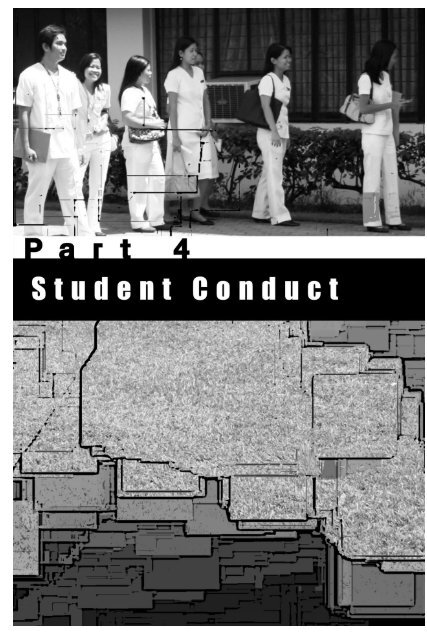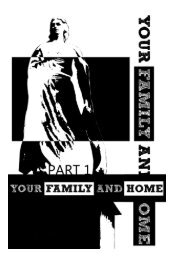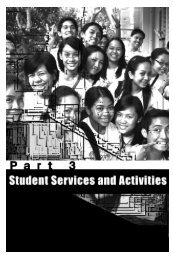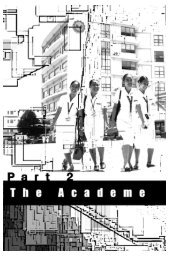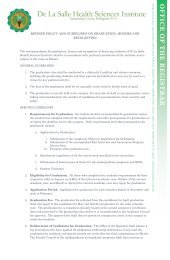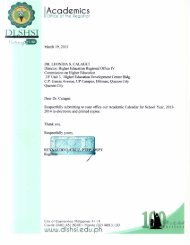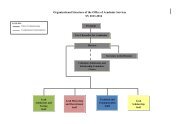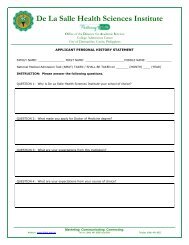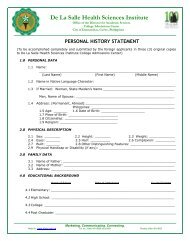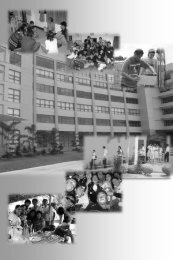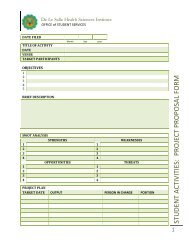Part 4: Student Conduct - De La Salle Health Sciences Institute
Part 4: Student Conduct - De La Salle Health Sciences Institute
Part 4: Student Conduct - De La Salle Health Sciences Institute
You also want an ePaper? Increase the reach of your titles
YUMPU automatically turns print PDFs into web optimized ePapers that Google loves.
<strong>Student</strong> Handbook 2010-2013<br />
Section 19<br />
GENERAL DIRECTIVES<br />
<strong>De</strong> <strong>La</strong> <strong>Salle</strong> <strong>Health</strong> <strong>Sciences</strong> <strong>Institute</strong> (DLSHSI) is a Catholic<br />
educational institution that is part of <strong>De</strong> <strong>La</strong> <strong>Salle</strong> Philippines, Inc.<br />
<strong>Student</strong>s are expected to act as mature Christians at all times, whether<br />
on or off campus. They are to familiarize themselves with the contents<br />
of this <strong>Student</strong> Handbook and strictly comply with all the provisions<br />
herein.<br />
<strong>Student</strong>s admitted to DLSHSI are regarded as responsible individuals.<br />
Hence, it is their duty to keep their parents/guardians informed of their<br />
academic standing and the consequences of excessive absences or<br />
failures. Notices thereof that may be sent by DLSHSI to<br />
parents/guardians are merely by way of courtesy. These do not relieve<br />
the students of their obligation to inform their parents/guardians of their<br />
standing in school. Ignorance of a student’s status on the part of the<br />
parents/guardians should not be blamed on the DLSHSI.<br />
<strong>Student</strong>s may be required to attend masses, spiritual retreats and<br />
recollections, and/or similar activities. In the performance of their<br />
obligations, all students must act in accordance with Christian<br />
principles, Filipino traditions and ideals and DLSHSI policies. When a<br />
student does not measure up to these standards, he/she may be<br />
asked to withdraw from the DLSHSI.<br />
19.1. Courtesy<br />
In dealing with members of the academic community, students<br />
are expected to observe Filipino norms of courtesy.<br />
It is considered unethical for any student to make remarks that<br />
are uncalled for. It is encouraged that at all times the students<br />
are expected to uplift the <strong>La</strong>sallian values.<br />
School administrators, faculty members, and support staff, may<br />
call the attention of students who display unbecoming behavior<br />
during officially sanctioned DLSHSI activities inside or outside<br />
80 | <strong>Student</strong> <strong>Conduct</strong>
<strong>De</strong> <strong>La</strong> <strong>Salle</strong> <strong>Health</strong> <strong>Sciences</strong> <strong>Institute</strong><br />
the campus. Abusive behavior or discourtesy towards HSI<br />
officials, faculty, staff, discipline officers, security guards and<br />
fellow students shall be dealt with accordingly.<br />
19.2. Persons in Authority<br />
19.3. Uniform<br />
School administrators and parentis members exercise special<br />
parental authority “in loco parentis” in relation to all students<br />
of DLSHSI. The Discipline Officers and Security Guards are<br />
also persons in authority and must be accorded proper<br />
courtesy. As such, they shall have the right and duty to<br />
apprehend and refer any erring student to the members of the<br />
DLSHSI discipline and security unit or College Discipline<br />
Boards for appropriate action.<br />
Wearing of uniform is compulsory unless the student has a<br />
written permit from the <strong>De</strong>an of <strong>Student</strong> Services or her/his<br />
duly authorized representative. The written permit must be<br />
presented upon demand.<br />
<strong>Student</strong>s are required to wear the prescribed uniform and<br />
their school IDs inside the school premises during class hours<br />
and clinical duty hours and other days prescribed by their<br />
respective Colleges. (Please see College Handbook)<br />
<strong>Student</strong>s who have no classes but need to come to DLSHSI<br />
must wear their school IDs.<br />
In instances when the students will be in civilian clothing, the<br />
following are not allowed:<br />
19.3.1. All kinds of shorts<br />
19.3.2. Sleeveless shirts, blouses and dresses (except with an<br />
overlying blazer which must be worn while inside the<br />
campus)<br />
19.3.3. Blouses and dresses that reveal or expose the breasts,<br />
navel and/or undergarments<br />
19.3.4. Midriffs, hanging blouses (which expose the abdominal<br />
area and/or lower back)<br />
19.3.5. Mini-skirts (note: skirt length should not expose more<br />
than one third of the thigh)<br />
19.3.6. Hats and caps worn inside classrooms and offices<br />
19.3.7. Slippers (except in areas where these are<br />
needed/required)<br />
<strong>Student</strong> <strong>Conduct</strong> | 81
<strong>Student</strong> Handbook 2010-2013<br />
19.3.8. Body piercing (except for earrings in females)<br />
19.4. ID Card<br />
19.4.1. All officially enrolled students must have their ID card<br />
validated each enrollment period. Any student who uses<br />
the ID of another and/or lends her/his ID for somebody<br />
else’s use shall be sanctioned accordingly. A College<br />
may adopt the use of a College pin and/or nameplate in<br />
addition to the required ID.<br />
19.4.2. Persons in authority have the right to ask for the<br />
student’s ID when the need arises. ID cards may be<br />
confiscated by persons in authority when a student<br />
violates rules and regulations.<br />
19.4.3. <strong>Student</strong>s who have transferred residence or have<br />
changed their civil status should inform the Registrar’s<br />
Office in writing about this matter at the earliest possible<br />
time.<br />
19.4.4. <strong>Student</strong>s are liable for incorrect information on their IDs,<br />
registration forms, and other school documents.<br />
19.4.5. Lost ID cards must be surrendered to the Office of<br />
<strong>Student</strong> Services (OSS) and then endorsed to the Office<br />
of the Registrar.<br />
19.4.6. <strong>Student</strong>s who lost an ID should:<br />
19.4.6.1. Report the lost ID to the OSS within 48 hours.<br />
19.4.6.2. Present an alternate picture-bearing identification<br />
card together with his current registration form.<br />
19.4.6.3. Secure a Certificate of Loss from the OSS.<br />
19.4.6.4. Present the referral from OSS to the Office of the<br />
Registrar and apply for a new ID card.<br />
19.4.6.5. Pay for the new ID card at the Cashier.<br />
19.4.6.6. Secure a temporary gate pass from the OSS. The<br />
gate pass should indicate its period of validity.<br />
19.4.6.7. The temporary gate pass should be surrendered to<br />
the Registrar’s Office upon receipt of the new<br />
permanent ID card.<br />
82 | <strong>Student</strong> <strong>Conduct</strong>
<strong>De</strong> <strong>La</strong> <strong>Salle</strong> <strong>Health</strong> <strong>Sciences</strong> <strong>Institute</strong><br />
19.5. Invited Guests/Visitors<br />
If a student invites anybody from outside the campus, an<br />
endorsement should be secured from the <strong>De</strong>an of the<br />
College concerned and copy furnished the <strong>De</strong>an of Office<br />
Services.<br />
19.6. Bulletin Boards<br />
19.6.1. It is the privilege of recognized organizations and<br />
student councils to post their announcements in<br />
assigned bulletin boards.<br />
19.6.2. Announcements shall be posted only on bulletin boards.<br />
Walls or windows should not be used for posting<br />
announcements.<br />
19.6.3. Posters or notices may only be posted after approval by<br />
the adviser, endorsed by the College <strong>De</strong>an to the <strong>De</strong>an<br />
of <strong>Student</strong> Services then to the Institutional<br />
Communication Office (ICO) for final approval and<br />
posting.<br />
19.6.4. <strong>Student</strong>s who post announcements without prior<br />
approval of the said offices shall be dealt with<br />
accordingly.<br />
19.6.5. The standard duration of all postings will depend on the<br />
time frame that the ICO will prescribe. It is the<br />
responsibility of the organization to remove its materials<br />
after the prescribed duration of posting.<br />
19.6.6. <strong>Student</strong>s caught defacing, mutilating, or removing<br />
posters within their valid period of posting shall be<br />
subject to disciplinary sanctions. Presidents of<br />
organizations who do not remove posters at the<br />
prescribed time shall be guilty of a minor offense. (see<br />
Sec. 20.10).<br />
<strong>Student</strong> <strong>Conduct</strong> | 83
<strong>Student</strong> Handbook 2010-2013<br />
19.7. Classroom Policies<br />
<strong>Student</strong>s are expected to abide by the classroom policies set<br />
by their own College<br />
19.8. DLSHSI Facilities<br />
DLSHSI encourages students to use campus facilities for social,<br />
cultural, sports and recreational activities. <strong>Student</strong>s may be denied the<br />
right to use the facilities if they do not abide by the regulations on the<br />
use of such facilities.<br />
19.9. Suspension of Classes<br />
19.9.1. The DLSHSI official authorized to suspend classes is<br />
the Vice Chancellor for Academics.<br />
19.9.2. DLSHSI follows storm signals for both Metro Manila and<br />
Southern Luzon. If storm signal number 3 or 4 is<br />
sounded in either area, classes in the undergraduate<br />
and graduate levels shall be automatically suspended<br />
except for the fourth year medical level who are on duty.<br />
19.9.3. If no official public announcement is made before 5 a.m.,<br />
it should be assumed that classes will go on and offices<br />
will be open. However, announcements on suspension<br />
of classes may be made later in the day. Security guard<br />
outposts and the telephone operator will be duly<br />
informed in case of suspension of classes.<br />
19.9.4. Announcements by the Commission on Higher<br />
Education (CHED) or other government agencies<br />
concerning floods, earthquakes, jeepney/bus strikes,<br />
coup d’etat or other emergencies that apply only to<br />
Metro Manila do not automatically apply to DLSHSI.<br />
19.10. Campus Curfew<br />
For campus security reasons, a student should be out of<br />
her/his classroom/College by 7:00 p.m. from Mondays to<br />
Saturdays unless authorized by her/his College <strong>De</strong>an or<br />
<strong>De</strong>an of <strong>Student</strong> Services.<br />
84 | <strong>Student</strong> <strong>Conduct</strong>
<strong>De</strong> <strong>La</strong> <strong>Salle</strong> <strong>Health</strong> <strong>Sciences</strong> <strong>Institute</strong><br />
Section 20<br />
STUDENT DISCIPLINE<br />
It is very important for students to maintain a clean discipline record to<br />
be assured of their continued stay in DLSHSI. This section aims to<br />
orient them with the discipline policies, rules and regulations, as well as<br />
structures, procedures, and practices.<br />
20.1. Discipline Boards<br />
20.1.1. College Discipline Boards<br />
20.1.1.1. The College Discipline Boards (CDB) and their chairpersons<br />
are appointed by their respective College<br />
<strong>De</strong>ans. They are in charge of the enforcement of<br />
student discipline policies, rules and regulations in<br />
their respected colleges.<br />
20.1.1.2. Each CDB is composed of three faculty members of<br />
the college involved, the College <strong>Student</strong> Council<br />
President or her/his representative, and the Chair of<br />
<strong>Student</strong> Discipline and Security.<br />
20.1.1.3. The functions of the CDB are the following:<br />
20.1.1.3.1. <strong>Conduct</strong>s investigation on students<br />
who violate school rules and<br />
regulations<br />
20.1.1.3.2. Recommends to the <strong>De</strong>an of <strong>Student</strong><br />
Services appropriate penalties for<br />
offenses committed<br />
20.1.1.3.3. Maintains and records all offenses of<br />
violations<br />
20.1.1.3.4. Forwards all recorded violations to the<br />
<strong>De</strong>an of <strong>Student</strong>s noted by the Chair<br />
of <strong>Student</strong> Discipline and Security<br />
20.1.1.3.5. Summons students<br />
<strong>Student</strong> <strong>Conduct</strong> | 85
<strong>Student</strong> Handbook 2010-2013<br />
20.1.2. Institutional Discipline Board<br />
20.1.2.1. The Institutional Discipline Board (IDB) may be<br />
convened to hear, deliberate, and decide on appeals<br />
by students/parents and cases referred by the <strong>De</strong>an<br />
of <strong>Student</strong> Services.<br />
20.1.2.2. The IDB is composed of the following:<br />
20.1.2.2.1. <strong>De</strong>an of <strong>Student</strong> Services acting as<br />
the Chair<br />
20.1.2.2.2. College <strong>De</strong>an (s) of the student(s)<br />
involved<br />
20.1.2.2.3. Chair for <strong>Student</strong> Discipline and<br />
Security<br />
20.1.2.2.4. Institutional <strong>Student</strong> Council President<br />
or her/his representative<br />
20.1.2.2.5. A representative of the Faculty<br />
Association.<br />
20.2. Discipline Officers<br />
20.2.1. They are under the direct supervision of the Chair for<br />
<strong>Student</strong> Discipline and Security under the Office of<br />
<strong>Student</strong> Services.<br />
20.2.2. The function of the Discipline Officer is to:<br />
20.2.2.1. Maintain peace and order as well as promote<br />
cleanliness in the campus.<br />
20.2.2.2. Monitor activities of students and student groups oncampus<br />
20.2.2.3. Apprehend and/or confiscate the ID of a student<br />
caught or suspected of violating school rules and<br />
regulations<br />
20.2.2.4. Prepare and submit required investigation/incident<br />
report of discipline cases to the Chair for <strong>Student</strong><br />
Discipline and Security, copy furnished CDB.<br />
20.2.2.5. Serve summons to student(s) relative to the violation<br />
of the student handbook<br />
20.2.2.6. Network with offices and units of the institute<br />
regarding student discipline and decorum.<br />
86 | <strong>Student</strong> <strong>Conduct</strong>
<strong>De</strong> <strong>La</strong> <strong>Salle</strong> <strong>Health</strong> <strong>Sciences</strong> <strong>Institute</strong><br />
20.3. Special Powers<br />
The Vice Chancellor for Academics, <strong>De</strong>an of <strong>Student</strong> Services,<br />
College <strong>De</strong>ans and Vice <strong>De</strong>ans are granted the special power to<br />
give preventive suspension to students caught participating in<br />
cheating, rumbles, tumultuous affrays, boycotts, or illegal<br />
demonstrations for a maximum period of fifteen (15) school days.<br />
This may be appealed before the Institutional Discipline Board<br />
within five (5) days from the receipt of the decision by the person<br />
concerned.<br />
20.4. Preventive Suspension<br />
A student under investigation of a case involving the penalty of<br />
expulsion may be preventively suspended from entering the<br />
school premises if the evidence of guilt is strong and the school<br />
head is morally convinced that the student’s presence<br />
compromises the normal operations of the school or poses a<br />
risk or danger to life and property.<br />
20.5. Procedure<br />
20.5.1. Upon receipt of the written report on misconduct of any<br />
student, the Chairperson of the Discipline Board (CDB)<br />
shall initiate the investigation of the charge filed<br />
against a student. He/she shall send a notice which<br />
requires the student to answer the charge and/or to<br />
appear for questioning before the CDB within 48 hours<br />
from the receipt of the notice.<br />
20.5.2. Except in meritorious cases, determined by the<br />
CDB, the failure of the student to answer the charge<br />
and/or to appear during the hearing shall be<br />
construed as admission of guilt.<br />
20.5.3. If an investigation has been carried out and sufficient<br />
evidence has been found by the CDB or if the accused<br />
has admitted his/her guilt, the CDB shall render a<br />
decision and recommend appropriate sanctions. Copies<br />
thereof shall be sent to the parties involved, <strong>De</strong>an of<br />
<strong>Student</strong> Services, College <strong>De</strong>an(s) and the University<br />
Registrar.<br />
20.5.4. If the decision of the CDB is not acceptable to the<br />
student, it could be appealed by the student to the <strong>De</strong>an<br />
<strong>Student</strong> <strong>Conduct</strong> | 87
<strong>Student</strong> Handbook 2010-2013<br />
of <strong>Student</strong> Services through the Chair of <strong>Student</strong><br />
Discipline and Security who now convenes the<br />
Institutional Discipline Board (IDB). The respondent and<br />
her/his parent/guardian are to be notified by the IDB of<br />
the date of hearing. Notice to the parents/guardian given<br />
to the student involved shall be deemed sufficient. In<br />
the event of the failure of the respondent and/or her/his<br />
parents/guardian to appear, the IDB shall proceed with<br />
the hearing without prejudice to their appearance in<br />
subsequent hearings. Evidence, whether testimonial or<br />
documentary, shall not be limited to those obtained by<br />
the CDB. Postponement shall not be allowed except for<br />
highly justifiable reasons as ruled by the Chairperson.<br />
20.5.5. A record of the entire procedure shall be taken and filed.<br />
The proceedings may likewise be tape-recorded by the<br />
board. All records of the proceedings shall be<br />
submitted to the Chairperson who shall have custody of<br />
such records and tapes. The parties may be furnished a<br />
copy of the minutes.<br />
20.5.6. The board shall render a decision within 20 days from<br />
the date of the last hearing whether or not the parties<br />
submit their memoranda. The decision is final and<br />
executory. It shall be in writing and shall state the<br />
reasons for such a decision. The <strong>De</strong>an of <strong>Student</strong><br />
Services shall impose the sanctions, if any, based on the<br />
recommendations of the IDB. Copies thereof shall be<br />
sent to all parties and submitted to the Vice Chancellor<br />
for Academics and the University Registrar.<br />
20.6. Postponement of Hearing<br />
The following should be observed in cases of postponement:<br />
20.6.1. A written request for postponement must be filed with<br />
the <strong>De</strong>an of <strong>Student</strong> Services at least two (2) days<br />
before the scheduled date of hearing.<br />
20.6.2. Oral requests for postponement shall not be entertained<br />
unless presented during the hearing immediately<br />
preceding the scheduled hearing.<br />
20.6.3. Notice to the parents/guardian given to the student<br />
involved shall be deemed sufficient.<br />
20.6.4. Written request for postponement filed beyond the<br />
prescribed period shall be denied, and the parties shall<br />
be required to attend the scheduled hearing.<br />
88 | <strong>Student</strong> <strong>Conduct</strong>
<strong>De</strong> <strong>La</strong> <strong>Salle</strong> <strong>Health</strong> <strong>Sciences</strong> <strong>Institute</strong><br />
20.7. Major Offenses<br />
<strong>Student</strong>s must be advised that as <strong>La</strong>sallians, everyone<br />
must exhibit the values that we uphold and proper decorum at<br />
all times within or even outside the institute especially if they<br />
are wearing their school uniform or any attire that identifies<br />
them as students of DLSHSI.<br />
These include but are not limited to: (see section 20.8 for<br />
sanctions)<br />
20.7.1. Gross Misconduct<br />
20.7.1.1. Lewd public display of affection or acts/gestures that<br />
offend members of the community like kissing,<br />
embracing, petting, necking, partners in dark places<br />
(e.g. parked vehicles at night), and other acts of<br />
lewdness. Minimum penalty of sanction 20.8.3.<br />
20.7.1.2. Possession of any of the following with minimum<br />
penalty sanction 20.8.3 without prejudice to the filing<br />
of criminal case in courts<br />
20.7.1.2.1. <strong>De</strong>adly weapon(s)<br />
20.7.1.2.2. Illegal drugs<br />
20.7.1.2.3. Pornographic material<br />
20.7.1.3. Acts of gross disrespect, in words or in deed that<br />
tends to insult or subject anyone to public<br />
ridicule/contempt. Minimum penalty is sanction<br />
20.8.3.<br />
20.7.1.4. Acts that discredit and dishonor the good name and<br />
reputation of DLSHSI as a malicious imputation of a<br />
crime or defect, whether real or imaginary. Minimum<br />
penalty is sanction 20.8.5.<br />
20.7.1.5. Vandalism and/or destruction of DLSHSI property or<br />
property belonging to any member of the DLSHSI<br />
community and guests. Minimum penalty are<br />
sanctions 20.8.1 and 20.8.5.<br />
20.7.1.6. Gambling. Minimum penalty is sanction 20.8.3.<br />
20.7.1.7. Reckless driving that may cause danger to persons<br />
or properties while inside the school premises.<br />
<strong>Student</strong> <strong>Conduct</strong> | 89
<strong>Student</strong> Handbook 2010-2013<br />
Minimum penalty is sanction 20.8.3, without<br />
prejudice to the filing of a civil action in regular<br />
courts.<br />
20.7.1.8. Habitual disregard or repeated willful violations of<br />
established policies and regulations set by DLSHSI.<br />
Minimum penalty is sanction 20.8.3.<br />
Example: Commission of a third minor offense of<br />
the same nature. Minimum penalty is sanction<br />
20.8.3.<br />
20.7.1.9. Violation of conditions of being under probation or<br />
suspension. Minimum penalty is sanction 20.8.8.<br />
20.7.1.10. Conviction before any court of any criminal<br />
offenses involving moral turpitude. Minimum penalty<br />
is sanction 20.8.8.<br />
20.7.1.11. Falsely accusing another student or refusing to<br />
identify a student who violated a school regulation.<br />
Minimum penalty is sanction 20.8.5.<br />
20.7.1.12. Entering the school premises under the influence of<br />
alcohol. Minimum penalty is sanction 20.8.5.<br />
20.7.1.13. Being under the influence of Illegal drugs. (Refer to<br />
Section 22)<br />
20.7.2. Dishonesty<br />
20.7.2.1. Cheating, including but not limited to the following<br />
acts:<br />
20.7.2.1.1. possession and distribution of<br />
unauthorized notes/materials in any<br />
form related to the examination<br />
20.7.2.1.2. deliberately looking at a neighbor’s<br />
examination paper<br />
20.7.2.1.3. allowing another to copy from one’s<br />
examination papers<br />
20.7.2.1.4. having somebody else take one’s<br />
examinations<br />
20.7.2.1.5. talking to another student without<br />
permission during the examination<br />
90 | <strong>Student</strong> <strong>Conduct</strong>
<strong>De</strong> <strong>La</strong> <strong>Salle</strong> <strong>Health</strong> <strong>Sciences</strong> <strong>Institute</strong><br />
20.7.2.1.6. passing copied work as one’s own<br />
(e.g. assigned report, term paper, case<br />
analysis, reaction paper).<br />
20.7.2.1.7. Minimum penalty sanctions 20.8.4 and<br />
20.8.5.<br />
20.7.2.2. Forging, falsifying and/or tampering of<br />
academic/official records/documents/ID/registration<br />
form/examination permit or attempting to practice<br />
any deception or fraud. Minimum penalty sanctions<br />
20.8.4 and 20.8.5.<br />
20.7.2.3. Stealing or any attempts thereof. Minimum penalty:<br />
sanctions 20.8.1 and 20.8.5.<br />
20.7.2.4. Unauthorized collection or extraction of money,<br />
checks, or other instruments used as equivalents of<br />
money, in connection with any matter, property or<br />
transaction pertaining to DLSHSI. Minimum penalty:<br />
sanctions 20.8.1 and 20.8.5.<br />
20.7.3. Violent Acts<br />
20.7.3.1. Physical injuries inflicted on any person. Minimum<br />
penalty is sanction 20.8.7.<br />
20.7.3.2. Officers and members of unrecognized<br />
organizations present during hazing shall be liable<br />
whether or not they actively participated. Officers of<br />
the group shall also be liable even if they were not<br />
present when hazing occurs. Minimum penalty is<br />
sanction 20.8.7.<br />
20.7.3.3. <strong>De</strong>liberate disruption of any DLSHSI activity or any<br />
other intentional act which tends to create disorder<br />
and/or tumult. Minimum penalty is sanction 20.8.5.<br />
20.7.3.4. Acts of subversion or insurgency including<br />
membership in any subversive organization working<br />
for the violent overthrow of the duly constituted<br />
government or in any illegal or immoral organization<br />
formed or established for the purpose of propagating<br />
and/or engaging in lawful and immoral acts and<br />
beliefs (e.g. satanic organizations). Minimum penalty<br />
is sanction 20.8.5.<br />
<strong>Student</strong> <strong>Conduct</strong> | 91
<strong>Student</strong> Handbook 2010-2013<br />
20.7.3.5. Threatening or preventing any student or school<br />
personnel from entering the school premises or<br />
attending classes or discharging their duties.<br />
Minimum penalty is sanction 20.8.5.<br />
20.7.4. Membership in unrecognized organizations like<br />
fraternities and sororities. Minimum penalty is sanction<br />
20.8.9.<br />
20.7.5. Such other acts as may be determined by the IDB<br />
provided the application of the rules on such acts shall<br />
be prospective in nature. Minimum penalty to be<br />
determined by the IDB.<br />
20.8. Sanctions for Major Offenses<br />
The severity of the offense and the mitigating or aggravating<br />
circumstances shall determine the gravity of the penalty or sanction<br />
to be imposed. These penalties/sanctions are:<br />
20.8.1. A fine equivalent to the value of the damaged property<br />
but in no case more than twice its value; or the<br />
replacement of the thing or property damaged,<br />
destroyed, lost or defaced, or the cleaning of the entire<br />
room or wall or part thereof, free from all marks and<br />
writings<br />
20.8.2. Withholding of diploma, transcript, and other school<br />
records for as long as the prescribed restriction or<br />
reparation of the damaged property has not been made<br />
20.8.3. Automatic academic suspension for five (5) days with<br />
one (1) year probation<br />
20.8.4. A grade of 0.00 for the examination(s)<br />
20.8.5. Academic suspension for a period of not less than five<br />
(5) but not more than twenty (20) school days<br />
20.8.6. Academic suspension for one (1) semester<br />
20.8.7. Academic suspension for one (1) school year<br />
20.8.8. Exclusion from the school/dropped from school rolls<br />
20.8.9. Expulsion (Note: According to Article XIV Section 77 of<br />
the manual of Regulations for Private Schools, expulsion<br />
92 | <strong>Student</strong> <strong>Conduct</strong>
<strong>De</strong> <strong>La</strong> <strong>Salle</strong> <strong>Health</strong> <strong>Sciences</strong> <strong>Institute</strong><br />
is usually considered proper punishment for<br />
major/serious offenses.)<br />
20.9. Readmission after suspension<br />
20.9.1. <strong>Student</strong>s must undergo counseling, <strong>La</strong>sallian formation,<br />
and/or community service during the period of academic<br />
suspension.<br />
20.9.2. To be readmitted to class after suspension, a written<br />
promise of future exemplary behavior signed by the<br />
student and countersigned by her/his parents or<br />
guardian is required and must be submitted to the Office<br />
of <strong>Student</strong> Services.<br />
20.10. Minor Offenses<br />
The following acts and all others not included in the foregoing<br />
enumeration shall be considered as minor offenses:<br />
20.10.1. Behavior unbecoming of a <strong>La</strong>sallian<br />
20.10.2. Disturbing classes without a valid reason<br />
20.10.3. Entering a class or breaking into any DLSHSI function<br />
without the permission of those concerned<br />
20.10.4. Disobeying DLSHSI regulations, such as loitering near<br />
classrooms during class sessions, unauthorized use of<br />
DLSHSI facilities, supplies and equipment, and eating<br />
inside the classroom<br />
20.10.5. Entering the campus without the prescribed uniform<br />
20.10.6. Possession of alcohol, tobacco, cigarettes<br />
20.10.7. Improper wearing of ID (should be visible) and uniform.<br />
The hem of the upper garment of the uniform should<br />
cover or reach the buttocks. Skirt length should at least<br />
reach below the knee<br />
20.10.8. Improper and unauthorized use of bulletin boards and<br />
instructional materials/media and defacing, mutilating or<br />
removing informational materials within valid period of<br />
posting.<br />
20.10.9. Wearing of earrings and longhair among male students<br />
<strong>Student</strong> <strong>Conduct</strong> | 93
<strong>Student</strong> Handbook 2010-2013<br />
20.10.10. Body piercing with ornament worn (except for earrings<br />
for females)<br />
20.10.11. Playing cards within the school premises.<br />
20.10.12. Hair highlights<br />
20.10.13. Such other acts as may be determined by the IDB<br />
provided the application of the rules on such acts shall<br />
be prospective in nature<br />
20.11. Sanctions for Minor Offenses<br />
20.11.1. Admonition by the Discipline Officer/any person in<br />
authority for the first offense<br />
20.11.2. For the third offense of the same nature – see Section<br />
20.7.1.<br />
20.11.3. Commission of four minor offenses – suspension for<br />
five (5) days<br />
94 | <strong>Student</strong> <strong>Conduct</strong>
<strong>De</strong> <strong>La</strong> <strong>Salle</strong> <strong>Health</strong> <strong>Sciences</strong> <strong>Institute</strong><br />
Section 21<br />
GRIEVANCE PROCEDURE<br />
As befits members of a Christian academic community, grievances<br />
against any member, policy, service, etc. of the community should be<br />
settled through sincere dialogue and discussion. It is only when such<br />
initial discussion fails that one should resort to formal procedures for<br />
settling such grievances.<br />
It is important that due process be observed. This can be done through<br />
proper communication. Written complaint is encouraged.<br />
When it is in writing and duly signed, it becomes a formal complaint<br />
needing a formal procedure. The complaint, answer, memorandum,<br />
recommendation and eventually the decision must also be in writing.<br />
Minutes of all proceedings shall also be in writing and shall be<br />
signed by all parties concerned. All original records of the proceedings<br />
shall be kept in the possession of the Office of the <strong>De</strong>an of <strong>Student</strong><br />
Services.<br />
21.1. Composition of the <strong>Student</strong> Grievance Board<br />
21.1.1. <strong>De</strong>an of <strong>Student</strong> Services as chair and presiding officer<br />
21.1.2. College <strong>De</strong>an of <strong>Student</strong> complainant<br />
21.1.3. College <strong>De</strong>an of the student/faculty respondent or the<br />
<strong>De</strong>partment Head of the staff respondent<br />
21.1.4. Representative of the Union of College <strong>Student</strong> Councils<br />
21.1.5. Representative of the Faculty Association<br />
21.2. Grievance Procedure<br />
21.2.1. For any grievance, the first person to approach for<br />
information and assistance is the faculty adviser.<br />
21.2.2. The student files her/his written complaint with the<br />
faculty adviser. If the complaint is against the faculty<br />
<strong>Student</strong> <strong>Conduct</strong> | 95
<strong>Student</strong> Handbook 2010-2013<br />
adviser, the student files her/his complaint to the <strong>De</strong>an<br />
through the Vice <strong>De</strong>an.<br />
21.2.3. The faculty adviser conducts a one-on-one conference<br />
with the student/faculty/staff respondent to settle the<br />
manner amicably.<br />
21.2.4. If the faculty adviser fails to resolve the case, he/she<br />
refers it to the <strong>De</strong>an through the Vice <strong>De</strong>an.<br />
21.2.5. If the decision on the case by the Vice <strong>De</strong>an/College<br />
<strong>De</strong>an is not satisfactory to the student complainant, the<br />
student may elevate the case to the Grievance Board.<br />
21.2.6. The <strong>De</strong>an of <strong>Student</strong> Services convenes the grievance<br />
Board, which then hears the case. He/she shall start the<br />
proceedings by reading the complaint and reply/ies filed<br />
before the Board.<br />
21.2.7. Once a decision is made by the Board, parties to the<br />
case are furnished their copies of the same. In case the<br />
complainant is not satisfied with the board’s decision, the<br />
student may move for a reconsideration of the case with<br />
the board within 48 hours after receipt thereof,<br />
otherwise, the decision becomes final and executory.<br />
21.2.8. The <strong>Student</strong> Grievance Board recommends solutions to<br />
the Vice Chancellor for Academics.<br />
96 | <strong>Student</strong> <strong>Conduct</strong>
<strong>De</strong> <strong>La</strong> <strong>Salle</strong> <strong>Health</strong> <strong>Sciences</strong> <strong>Institute</strong><br />
Section 22<br />
CONDUCT OF DRUG TESTING<br />
<strong>De</strong> <strong>La</strong> <strong>Salle</strong> <strong>Health</strong> <strong>Sciences</strong> <strong>Institute</strong> is envisioned to provide the<br />
highest quality of life in its community as well as to achieve total<br />
formation and development of its students. Alongside with its<br />
compliance with RA 9165 or the Comprehensive Dangerous Drugs<br />
Act of 2002, it is committed to promote and maintain a drug free<br />
environment for its students.<br />
22.1. General Guidelines<br />
22.1.1. The illegal use, sales, possession of illegal drugs inside<br />
and outside the school premises constitutes a major<br />
offense of the institutional student handbook and will be<br />
dealt with the appropriate sanctions and penalties.<br />
22.1.2. All old students from the different colleges will be<br />
subjected to the test.<br />
22.1.3. Incoming students and senior students will need to<br />
undergo mandatory drug testing.<br />
22.1.4. The drug testing agency will be the <strong>De</strong> <strong>La</strong> <strong>Salle</strong> Drug<br />
Testing Unit. Two testing methods will be done, the<br />
screening test which will determine the positive result as<br />
well as the type of drug used and the confirmatory test<br />
which will confirm a positive screening test.<br />
22.1.5. The <strong>Health</strong> and Safety Unit will hold meetings for those<br />
students who turned positive during the screening and<br />
confirmatory test.<br />
22.1.6. Results, records, and transcript of meetings in relation to<br />
drug testing will be treated with confidentiality.<br />
Disclosure of information will only be given to certain<br />
individuals who are important in the rehabilitation and<br />
formation of the student.<br />
<strong>Student</strong> <strong>Conduct</strong> | 97
<strong>Student</strong> Handbook 2010-2013<br />
22.1.7. The <strong>Health</strong> and Safety Unit of DLSHSI will offer<br />
assistance in the counseling and referral to rehabilitation<br />
centers.<br />
22.1.8. Education and training concerning the adverse effects of<br />
drugs must be properly disseminated to every student<br />
for proper awareness and practice.<br />
22.2. DRUG TESTING PROTOCOL<br />
22.2.1. SETTING DATES FOR TESTING<br />
22.2.1.1. For old students, to ensure full participation and<br />
compliance, no tests will be scheduled during,<br />
22.2.1.1.1. examination week<br />
22.2.1.1.2. semestral , Christmas and summer<br />
breaks<br />
22.2.1.1.3. institutional and national holidays<br />
22.2.1.1.4. institutional and collegiate activity<br />
22.2.1.2. Drug testing for incoming students is mandatory as a<br />
requirement for the admissions process. The date<br />
for drug testing will be specified by the school clinic.<br />
22.2.2. NOTIFICATION REGARDING THE PROCEDURE OF<br />
DRUG TEST<br />
22.2.2.1. Through the <strong>Health</strong> and Safety Unit, all students and<br />
their parents shall be notified through writing on the<br />
process and manner by which the drug testing shall<br />
be conducted. Notification will be sent at any time<br />
during the school year. Failure to return the<br />
acknowledgement receipt shall not be a bar to the<br />
conduct of the drug testing.<br />
22.2.2.2. For incoming <strong>Student</strong>s written notification on the<br />
process and manner of drug testing will be<br />
distributed by the Admissions office prior to the<br />
scheduled drug test. Failure to return the drug<br />
testing consent form shall not be a bar to the conduct<br />
of the drug testing.<br />
98 | <strong>Student</strong> <strong>Conduct</strong>
<strong>De</strong> <strong>La</strong> <strong>Salle</strong> <strong>Health</strong> <strong>Sciences</strong> <strong>Institute</strong><br />
22.2.3. SELECTION OF STUDENTS<br />
The students who will undergo drug testing for a specific<br />
date will be selected using cluster sampling. On the day<br />
of the test date, the student will be excused from the<br />
class and instructed to proceed to the laboratory. A call<br />
slip/acknowledgement slip with time in/out will be issued<br />
to the student to be signed by the laboratory staff on<br />
duty. An excused absence must be given to the student<br />
if he/she misses a quiz, examination or activity during<br />
the conduct of the test.<br />
22.2.4. URINE SPECIMEN COLLECTION PROCEDURE<br />
22.2.5. All students undergoing drug test shall abide with the<br />
method of collecting the urine specimen according to the<br />
procedures of the DLSUMC Drug testing <strong>La</strong>boratory.<br />
The following steps are<br />
22.2.5.1. Remove any unnecessary outer clothing (e.g. coat,<br />
jacket, hat, etc).<br />
22.2.5.2. Leave other personal belongings (e.g. briefcase,<br />
purse) with the outer clothing<br />
22.2.5.3. Empty pockets and display the items to ensure that<br />
no unacceptable items are present. The donor may<br />
retain his/her wallet and cell phone.<br />
22.2.5.4. Wash and dry hands in the hand washing area<br />
under DTL (Drug Testing <strong>La</strong>boratory) personnel<br />
observation. Do not wash hands again until after<br />
delivering the specimen to collector.<br />
22.2.5.5. Select the specimen collection container from the<br />
available supply.<br />
22.2.5.6. Enter the restroom used for urine specimen<br />
collection with the collection container together with<br />
the collector.<br />
22.2.6. Provide a specimen of at least 60ml (completely fill up<br />
container)<br />
22.2.7. Return the specimen to the collector within<br />
approximately 3 minutes of completing the void (i.e.<br />
longer waiting periods may cause the temperature to be<br />
<strong>Student</strong> <strong>Conduct</strong> | 99
<strong>Student</strong> Handbook 2010-2013<br />
out of range and necessitate a direct observed<br />
collection)<br />
22.2.8. Observe the sealing of the specimen bottles(s).<br />
22.2.9. Initial the bottle label(s)/seal(s) using care to avoid<br />
damaging them<br />
22.3. NOTIFICATION PROCEDURE IN CASE OF A POSITIVE<br />
FINDING<br />
If a student is found to be positive in the test, the health and safety<br />
unit will summon the student concerned and his/her<br />
parent/guardian (person in authority) for a conference with the<br />
school physician (for positive screening tests) or the class adviser,<br />
college dean and chair and vice chair of the drug board (for positive<br />
confirmatory test).<br />
22.4. SANCTIONS/PENALITIES<br />
22.4.1. First offense of (+) confirmatory test<br />
22.4.1.1. The student will undergo assessment by the school<br />
physician and recommend to the drug testing board<br />
whether the student should undergo counseling or<br />
rehabilitation. The student will be instructed to file for<br />
a leave of absence (LOA) while undergoing drug<br />
counseling/rehabilitation.<br />
22.4.1.2. After the expiration of the six (6)-month moratorium<br />
on drug test after testing positive for drug use and<br />
completion of the recommended action, the student<br />
must undergo a repeat drug test one month prior to<br />
their entry into the program and secure a clearance<br />
from the school physician before they are allowed to<br />
be admitted into the program.<br />
22.4.2. Second Offense of a (+) confirmatory test<br />
22.4.2.1. Expulsion from DLSHSI<br />
22.5. Non-compliance of drug test<br />
22.5.1. If in any circumstance the student was absent during the<br />
date to undergo a test, he/she must submit a written<br />
100 | <strong>Student</strong> <strong>Conduct</strong>
<strong>De</strong> <strong>La</strong> <strong>Salle</strong> <strong>Health</strong> <strong>Sciences</strong> <strong>Institute</strong><br />
notice of the reason of absence. The student will<br />
undergo the drug test in another date unannounced. If<br />
there will be one repeated absence on the date of the rescheduled<br />
drug test, the student will be subjected to<br />
disciplinary action as stated in the Institutional <strong>Student</strong><br />
Handbook Section 20.7.1.8. as a habitual disregard or<br />
repeated willful violation of established policies and<br />
regulations.<br />
22.5.2. Refusal to submit oneself to drug testing will<br />
automatically be subjected to the appropriate disciplinary<br />
action as stated in the Institutional <strong>Student</strong> Handbook<br />
Section 20.7.1.8. as a habitual disregard or repeated<br />
willful violation of established policies and regulations<br />
with penalty stated in 20.8.3.<br />
<strong>Student</strong> <strong>Conduct</strong> | 101
<strong>Student</strong> Handbook 2010-2013<br />
Section 23<br />
OTHER REGULATIONS<br />
Other rules and regulations pertaining to student conduct may be<br />
formulated by the Administration from time to time.<br />
Section 1.<br />
RULES AND REGULATIONS IMPLEMENTING<br />
THE ANTI-SEXUAL HARASSMENT ACT OF 1995<br />
PART 1: PRELIMINARY MATTERS<br />
Title- This body of rules and regulations shall be known as the rules<br />
and regulations for the implementation of the Anti-Sexual<br />
Harassment Act of 1995 at <strong>De</strong> <strong>La</strong> <strong>Salle</strong> <strong>Health</strong> <strong>Sciences</strong> <strong>Institute</strong> or<br />
“rules” for short.<br />
Section 2.<br />
Coverage – These rules shall govern incidents of sexual<br />
harassment inside the campus of <strong>De</strong> <strong>La</strong> <strong>Salle</strong>- <strong>Health</strong> <strong>Sciences</strong><br />
<strong>Institute</strong>, as well as incidents outside the campus premises and/or<br />
during the semestral or summer vacation, if such incidents<br />
adversely affect the good name or reputation of the institution.<br />
Section 1.<br />
PART 2: POLICIES<br />
State Policy – The state shall value the dignity of very individual,<br />
enhance the development of its human resources, guarantee full<br />
respect for human right, and uphold the dignity of all members and<br />
elements of the educational community, other workers, applicants<br />
for employment, those undergoing training, instruction or education.<br />
Towards this end, all forms of sexual harassment in the<br />
employment, education or training environment are hereby declared<br />
unlawful.<br />
102 | <strong>Student</strong> <strong>Conduct</strong>
<strong>De</strong> <strong>La</strong> <strong>Salle</strong> <strong>Health</strong> <strong>Sciences</strong> <strong>Institute</strong><br />
It is therefore the duty of the employer or the head of the workrelated,<br />
educational or training environment or institution to<br />
prescribe the guidelines in the workplace and educational or training<br />
institutions to prevent or deter the commission of acts of sexual<br />
harassment, and to provide the procedures for the resolution,<br />
settlement or prosecutions of said acts.<br />
Section 2.<br />
School Policies and Objective – The mission of this institution is<br />
to foster an open learning and working environment. The ethical<br />
obligation to provide an environment that is free from sexual<br />
harassment and from fear is imperative. The entire educational<br />
community condones any act of sexual harassment<br />
Violation of this policy shall result in disciplinary action to and<br />
including expulsion or termination as the case may be.<br />
All members of the educational community affected by a sexual<br />
harassment incident shall be treated with respect and given full<br />
opportunity to present their side of the incident.<br />
PART 3: SEXUAL HARASSMENT<br />
Rule 1 - Preliminary Provisions<br />
Section 1.<br />
Work, Education or Training – Related Sexual Harassment<br />
<strong>De</strong>fined – work, education or training-related sexual harassment is<br />
committed by an employer, employee, manager, supervisor, agent<br />
of the employer, teacher, instructor, professor, coach, trainer, or any<br />
other person who, having authority, influence or moral ascendancy<br />
over another in a work or training or education environment,<br />
demands, requests or otherwise require any sexual favor from the<br />
other, regardless of whether or not the demand, request or<br />
requirements for submission is accepted.<br />
<strong>Student</strong> <strong>Conduct</strong> | 103
<strong>Student</strong> Handbook 2010-2013<br />
A. In a work-related or employer environment, sexual<br />
harassment is committed when:<br />
1. The sexual favor is made as condition in the hiring<br />
or the employment, re-employment or continued<br />
employment of the said individual or in granting<br />
said individual, favorable compensation, terms<br />
conditions, promotions or privileges, or the refusal<br />
to grant the sexual favor results in limiting,<br />
segregating or classifying the employee which in<br />
any way would discriminate, deprive or diminish<br />
employment opportunities or otherwise adversely<br />
affect said employee;<br />
2. The above would result in an intimidating, hostile<br />
or offensive environment for the employee;<br />
3. The above acts would impair the employee’s<br />
rights or privileges under existing labor laws.<br />
B. In an education or training environment, sexual<br />
harassment is committed:<br />
4. Against one who is under the care, custody or<br />
supervision of the offender;<br />
5. Against one whose education, training,<br />
apprenticeship or tutorship is entrusted to the<br />
offender;<br />
6. When sexual favor is made a condition to the<br />
giving of a passing grade, or the granting of honor<br />
and scholarship, or the payment for the stipend,<br />
allowance or other benefit, privileges, or<br />
consideration; or<br />
7. When the sexual advance results in an<br />
intimidating, hostile or offensive environment for<br />
the student, trainee or apprentice.<br />
Sexual harassment can be verbal, visual, or physical. It can be<br />
overt, as in the suggestion that a person could get higher grade or<br />
raise by submission to sexual advances.<br />
104 | <strong>Student</strong> <strong>Conduct</strong>
<strong>De</strong> <strong>La</strong> <strong>Salle</strong> <strong>Health</strong> <strong>Sciences</strong> <strong>Institute</strong><br />
Section 2.<br />
Forms of Sexual Harassment – Sexual harassment may consist of<br />
the following:<br />
A. Persistent, unwanted attempts to change a professional or<br />
educational relationship to a personal one.<br />
B. Unwelcome sexual flirtations and inappropriate put-downs<br />
of individual person or classes of people. Example include,<br />
but are not limited to the following:<br />
1. Unwelcome sexual advances;<br />
2. Repeated sexual – oriented kidding, teasing, or<br />
flirting;<br />
3. Verbal abuse of a sexual nature;<br />
4. Graphic commentary about an individual’s body’<br />
sexual prowess, or sexual deficiencies;<br />
5. <strong>De</strong>rogatory or demeaning comment about women<br />
in general, whether sexual or not;<br />
6. Leering, whistling, touching, pinching, or brushing<br />
against another’s body;<br />
7. Offensive crude language; and<br />
8. Displaying objects or pictures which are sexual in<br />
nature that would create an offensive work of living<br />
environment.<br />
Section 3.<br />
Other Persons Liable – Any person who directs or induces another<br />
to commit any act of sexual harassment as herein defined, or who<br />
cooperate in the commission thereof by another with out which it<br />
would not have been committed, shall also be liable with these<br />
rules.<br />
Section 4.<br />
<strong>Student</strong> <strong>Conduct</strong> | 105
<strong>Student</strong> Handbook 2010-2013<br />
Basic Type Of Sexual Harassment – The following are considered<br />
basic type of sexual harassment.<br />
A. “Quid pro quo” sexual harassment – occurs when<br />
submission to or rejection of unwelcome sexual advances,<br />
request to engage in sexual advances, request to engage<br />
in sexual conduct, and other physical and expressive<br />
behavior of sexual nature is used as the basis for<br />
employment decisions, giving of passing grades, granting<br />
of honor and scholarship, or the payment of stipend<br />
allowance or other benefits, privileges, or consideration.<br />
Quip pro quo sexual harassment cases are hereby<br />
classified as grave.<br />
B. Hostile or Offensive sexual harassment – occurs when<br />
unwelcome sexual conduct unreasonably interferes with an<br />
individual job performance or creates an intimidating,<br />
hostile , or offensive working environment, even in the<br />
absence of the tangible or economic job consequences.<br />
Hostile or offensive sexual harassment cases are hereby classified<br />
as grave, less grave or light, depending on the reasonable<br />
man/woman standards adopted by the committee.<br />
Section 5.<br />
Sanction – The following administrative sanction shall be imposed<br />
on sexual harassment cases:<br />
A. For work – related incidents of sexual harassment:<br />
1. Suspension<br />
2. Dismissal<br />
B. For education or training – related act of sexual<br />
harassment:<br />
1. Suspension<br />
2. Exclusion<br />
3. Expulsion<br />
106 | <strong>Student</strong> <strong>Conduct</strong>
<strong>De</strong> <strong>La</strong> <strong>Salle</strong> <strong>Health</strong> <strong>Sciences</strong> <strong>Institute</strong><br />
Sexual harassment offenses shall be classified as grave, less grave<br />
and light.<br />
Grave Sexual harassment cases are those to which this rules attach<br />
the penalty of dismissal, or exclusion, or expulsion.<br />
Less grave sexual harassment cases are those to which this rules<br />
attach the penalty of suspension.<br />
Light sexual harassment cases and hose to which these rules attach<br />
the penalty or reprimand and warning.<br />
Section 6.<br />
.<br />
Sanction Not A Bar To Court Action. Administrative sanction shall<br />
not be a bar to prosecution in the proper court of unlawful act of<br />
sexual harassment.<br />
PART 4: GRIEVANCE PROCEDURE<br />
(See Section 21)<br />
Rule I - Due Process<br />
Section 1.<br />
Right to Due Process – No disciplinary sanction shall be applied<br />
upon any erring member of the educational community except for<br />
causes and after due process shall have been observed.<br />
In sexual harassment cases, the alleged offender must be<br />
afforded due process and the whole process shall be treated<br />
confidential.<br />
Section 2.<br />
Procedural Due Process Standards – The following procedural<br />
due process standard must be met in sexual harassment cases:<br />
<strong>Student</strong> <strong>Conduct</strong> | 107
<strong>Student</strong> Handbook 2010-2013<br />
A. There must be an impartial body or investigation committee<br />
who shall acquire jurisdiction over the person of the alleged<br />
offender.<br />
B. The Alleged offender must be informed in writing of the<br />
nature and cause of accusation against him<br />
C. The alleged offender must be given the opportunity to<br />
defend himself.<br />
D. The alleged offender shall have the right to adduce<br />
evidence on his own behalf and the evidence must be<br />
considered by the investigating committee deciding the<br />
case.<br />
Section 1.<br />
108 | <strong>Student</strong> <strong>Conduct</strong><br />
RULE II - Complaint and Reporting System<br />
Complaint <strong>De</strong>fined – A complaint is a sworn written statement<br />
under oath charging a person with violation of sexual harassment<br />
and subscribes before the proper authority.<br />
Section 2.<br />
Who May File – Any student or employee of the school may file a<br />
complaint of sexual harassment.<br />
Section 3.<br />
Where to File – A complaint may file in the office of the chairperson<br />
where he belongs.<br />
Section 4.<br />
Sufficiency of Complaint – A complaint is sufficient of it states<br />
the name of the respondent, the detailed narration of events was<br />
committed and the name of any witness, if there be any.<br />
Section 5.<br />
Proceeding for Investigation – Upon receipt of the written<br />
complaint signed under oath by he offended party or by any person<br />
having a direct knowledge of the commission on the act complained,<br />
the chairperson believes that there is reasonable ground and prima
<strong>De</strong> <strong>La</strong> <strong>Salle</strong> <strong>Health</strong> <strong>Sciences</strong> <strong>Institute</strong><br />
facie case has been established, he shall immediately furnish the<br />
respondent a copy of complaint together with the other necessary<br />
documents. The respondent is given 48 hours to file an answer from<br />
the time of receipt hereby. In case the respondent fails or refuses to<br />
answer, the case may be pushed through under summary<br />
proceeding.<br />
Section 6.<br />
Resolution Of The Case – Judgment in the case will be made<br />
immediately after the deliberation and the parties will be informed<br />
within two (2) days. The chairperson shall forward to the Office of<br />
the Institutional Disciplinary Board (IDB) which will receive for<br />
affirmation, reversal or modification of the decision.<br />
Section 7.<br />
Written Record and Privacy of <strong>Part</strong>ies – Written record of cases<br />
of sexual harassment must be kept, and precaution should be taken<br />
to protect the privacy of all parties involved.<br />
PART 5: MISCELLANEOUS PROVISIONS<br />
Rule I - Preventive Suspension<br />
Section 1.<br />
Preventive Suspension Of Accused In Sexual Harassment<br />
Cases – Any member of the educational community may be placed<br />
immediately under the preventive suspension during the pendency<br />
of the case of the evidence of his guilt is strong and the school head<br />
is morally convinced that the continued stay of the accused during<br />
the period of the investigation constitutes a distraction to the normal<br />
operation of the educational community. The chair shall make or<br />
submit recommendations to the <strong>De</strong>an/Head of the department to<br />
which the respondent belongs and shall inform the VCA of the<br />
suspension. The concerned office shall be furnished a copy.<br />
Section 2.<br />
Preventive suspension of student exceeding 205 of the total<br />
number of class hour shall be submitted to the Office of the<br />
Commission on Higher Education (CHED).<br />
<strong>Student</strong> <strong>Conduct</strong> | 109
<strong>Student</strong> Handbook 2010-2013<br />
Rule II - Independent Action for Damages and Prescription<br />
Section 1.<br />
Independent Action For Damages – Nothing in the Act or in these<br />
Rules shall preclude the victim from instituting a separate and<br />
independent action for damages and other affirmative relief.<br />
Section 2.<br />
Prescription Period – Any action arising from the violation of the<br />
provision of the act and these rule shall prescribe in three (3) years<br />
whether the student, faculty or employees is no longer enrolled or<br />
employed.<br />
110 | <strong>Student</strong> <strong>Conduct</strong>


